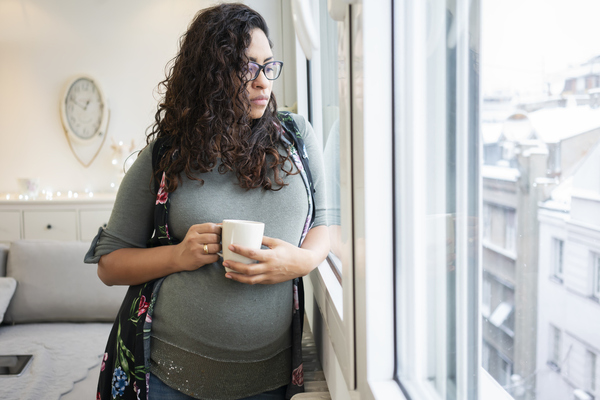Birth Companions publishes urgent call for improved care of pregnant women and mothers with children’s social care involvement.
The number of babies and infants subject to care proceedings is growing [1], while outcomes for mothers with social care involvement are getting worse as they fall between gaps in fragmented and overstretched services [2] [3]. As a result, vulnerable women and their babies are being let down.
We launch our new Birth Charter for women with involvement from children’s social care today, to help bring greater attention to the needs of women who are almost entirely overlooked in national policy and guidance in the health, social care and family justice systems.
Tens of thousands of women have contact with the children’s social care system during pregnancy and early motherhood each year in England. Some have an initial assessment and get early help from social workers. Some move into processes such as pre-proceedings or court proceedings. Thousands of mothers have their baby removed from their care by the family courts. Government reports show 5,410 infants under the age of one began being ‘looked after’ by the State in 2022 [4].
Since 1996 Birth Companions has supported hundreds of women in these circumstances. Some of those mothers have contributed to the Birth Charter, which also draws on the expertise of practitioners, commissioners, academics and many others working across health, social care, family law, the criminal justice system and beyond.
The Birth Charter sets out how services and systems in England should support all women involved with children’s social care from conception to their child’s second birthday. Fourteen principles are outlined to inform and shape policy, commissioning, and professional practice, and to support advocacy. In the Birth Charter, we call for a national health and social care pathway for pregnant women and mothers of infants who are subject to pre-birth or parenting assessment, or child protection proceedings.
Birth Companions’ Director Naomi Delap says:
“The health of many mothers in these situations is poor, and their treatment is often unfair. For example, women can be required to attend family court hearings very soon after birth, when they are still recovering, and they are not always given help to understand complex legal documents or processes.
“Despite the clear evidence of need, most general and specialist services are not designed with these mothers in mind. Professionals across the health, social care and voluntary sectors are doing admirable work, but this good practice is not consistent or widespread, and services are under-resourced and overstretched. There is no national pathway, and these women are missing from key health and social care policies.
“As a result, mothers who are separated from their babies are often left to cope with their grief alone, with no support to address the trauma of separation and the issues that may have contributed [5]. This can lead to the rapid escalation of mental health issues, substance use, domestic abuse and criminalisation [6], and we know that women in these situations are at risk of death by suicide or substance misuse. We urgently need to do better for them and their children.”
In MBRRACE-UK’s latest maternal mortality report [7], 20% of the women who died in pregnancy, birth or the year after birth were known to social services, up from 12% in 2012-14 and 17% in 2017-19. 11% of those who died by suicide and 59% of those who died through substance misuse had had an infant removed into care and/ or ongoing care proceedings.
Angela Frazer-Wicks lost her eldest two children to adoption in 2004. She knows first-hand the struggles mothers face and the power of appropriate support:
“Having only recently lost my children in 2004, I was homeless and struggling with mental health and addiction problems and was facing a very uncertain future. I genuinely felt I had nothing left to offer society and I had no real desire to keep going. Then, I had a chance meeting with someone who listened to me, believed me, felt my pain and let me grieve. She gave back so much that had been stripped from me and restored my passion for life. I went on to have another child, and now focus my energies on trying to improve this deeply flawed system to make sure other women don’t experience what I went through.”
Isabelle Trowler, Chief Social Worker for Children and Families in England, says:
“Today we see a great milestone towards family justice. I am very happy to support this Charter as a signpost to us all, that we can do great things collectively to support women and their families throughout pregnancy, those crucial early years and beyond. Stable Homes, Built on Love, the Government’s Reform Strategy, recognises how effective help can transform the future for families in need. It emphasises the crucial support role that family, friends and professionals all have in keeping children safely with their families wherever possible. As the Chief Social Worker for Children and Families, I will continue to champion the rights of families to stay together and fully support Birth Companions in their ambitious and principled endeavours.”
Naomi Delap adds:
“This Birth Charter is for pregnant women and mothers, and for all those involved in their care and support. We hope it will result in a new national health and social care pathway in England to deliver compassionate, trauma-informed, equitable support for women and their babies, and improved practice in the family courts. That would lead to fairer treatment and help disrupt intergenerational cycles of disadvantage.”
The Birth Charter for women with involvement from children’s social care is now available for download.
To request a hard copy of the Charter, please email: [email protected].
For further comment, or to find out more about Birth Companions’ work in this area, please email Kirsty Kitchen, Head of Policy and Communications: [email protected].
References
[1] Broadhurst, K., Alrouh, B. et al. (2018) Born into Care: Newborns in care proceedings in England, Nuffield Family Justice Observatory.
[2] Pattinson, R. et al. (2021) Newborn babies in urgent care proceedings in England and Wales, Nuffield Family Justice Observatory.
[3] Alrouh, B., Broadhurst, K. et al. (2021) Health vulnerabilities of parents in care proceedings in Wales, Nuffield Family Justice Observatory.
[4] Department for Education (2023) Children looked after in England including adoptions 2018-2022, GOV.UK.
[5] Broadhurst, K. and Mason, C. (2017) ‘Birth parents and the collateral consequences of court-ordered child removal: towards a comprehensive framework’, International Journal of Law, Policy and the Family, 31(1):41-59.
[6] 81 Ryan, M. (2021) Recurrent care proceedings: five key areas for reflection from the research, Nuffield Family Justice Observatory.
[7] MBRRACE-UK (2022) Saving Lives, Improving Mothers’ Care - Lessons learned to inform maternity care from the UK and Ireland. Confidential Enquiries into Maternal Deaths and Morbidity 2018-20, Oxford: National Perinatal Epidemiology Unit.




